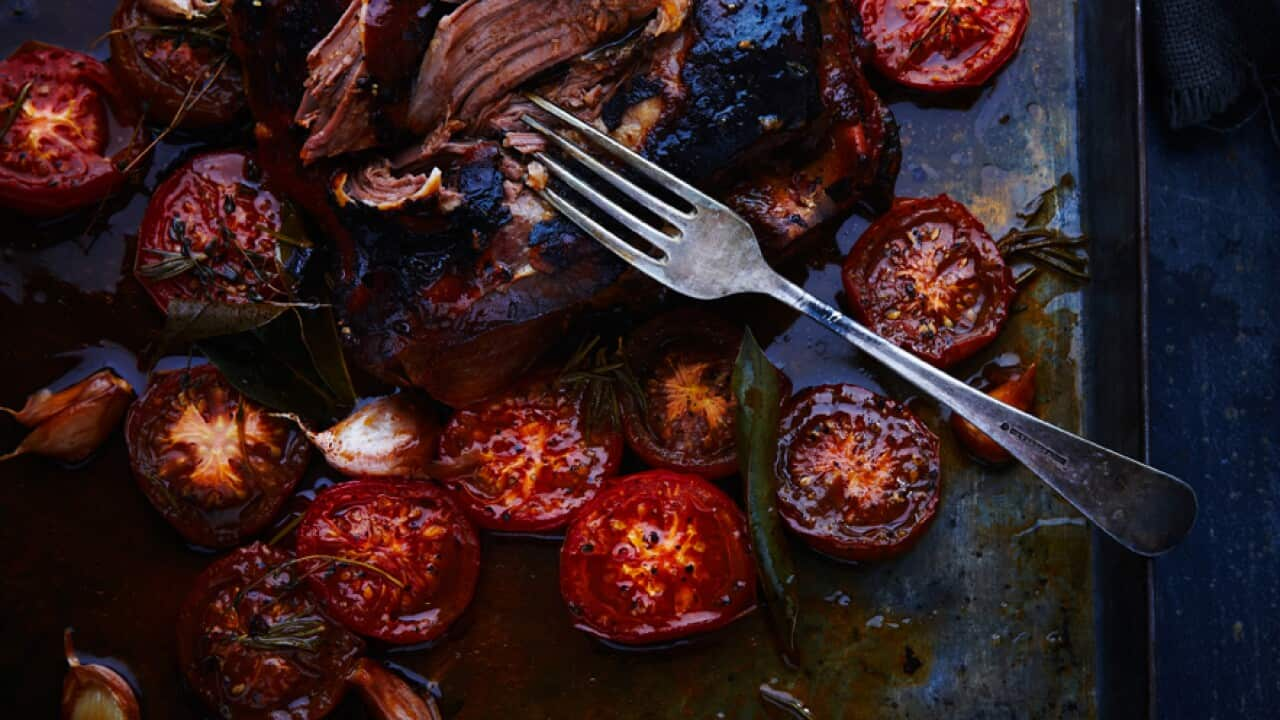serves
4–6
prep
15 minutes
cook
5 hours
difficulty
Easy
serves
4–6
people
preparation
15
minutes
cooking
5
hours
difficulty
Easy
level
Ingredients
- 2 kg leg of lamb, trimmed
- 1 garlic bulb, cloves separated (unpeeled)
- 2 tbsp tomato paste
- 2 tbsp olive oil, plus extra to drizzle
- 1½ cups (375 ml) verjuice or white wine vinegar
- 500 g kumatos, halved
- 500 g vine-ripened tomatoes, halved
- ½ bunch thyme sprigs
- 2 rosemary sprigs
- handful of fresh bay leaves
Instructions
Preheat the oven to 150ºC. Place the lamb in a large flameproof roasting pan.
Peel 2 garlic cloves and crush. Combine with tomato paste and oil, then season and brush over lamb. Pour verjuice into the pan around the lamb. Cover pan with a sheet of baking paper, then cover with 2 sheets of foil, sealing the edges so the steam doesn’t escape during cooking. Place in the oven and roast for 4 hours.
Remove the foil and baking paper, and then arrange the tomatoes, cut-side up, around the lamb. Sprinkle over the herbs, bay leaves and remaining garlic cloves. Drizzle tomatoes with oil and season.
Return the pan to the oven and roast, uncovered, for a further 1 hour or until the tomatoes have softened and the lamb is tender and falling off the bone.
Transfer the lamb and tomatoes to a plate and keep warm. Skim any fat from the juices in the roasting pan, and then place the pan over medium heat and cook, stirring, for 8–10 minutes until reduced. Pull the lamb from the bone and serve with tomatoes, garlic and pan juices.
Cook's notes
• Fresh bay leaves are available from selected greengrocers. Verjuice is unripe grape juice and is found at delis and gourmet food shops.
• Fresh bay leaves are available from selected greengrocers. Verjuice is unripe grape juice and is found at delis and gourmet food shops.
Photography by Petrina Tinslay, styling by David Morgan and art direction by Anne Marie Cummins.
Cook's Notes
Oven temperatures are for conventional; if using fan-forced (convection), reduce the temperature by 20˚C. | We use Australian tablespoons and cups: 1 teaspoon equals 5 ml; 1 tablespoon equals 20 ml; 1 cup equals 250 ml. | All herbs are fresh (unless specified) and cups are lightly packed. | All vegetables are medium size and peeled, unless specified. | All eggs are 55-60 g, unless specified.

